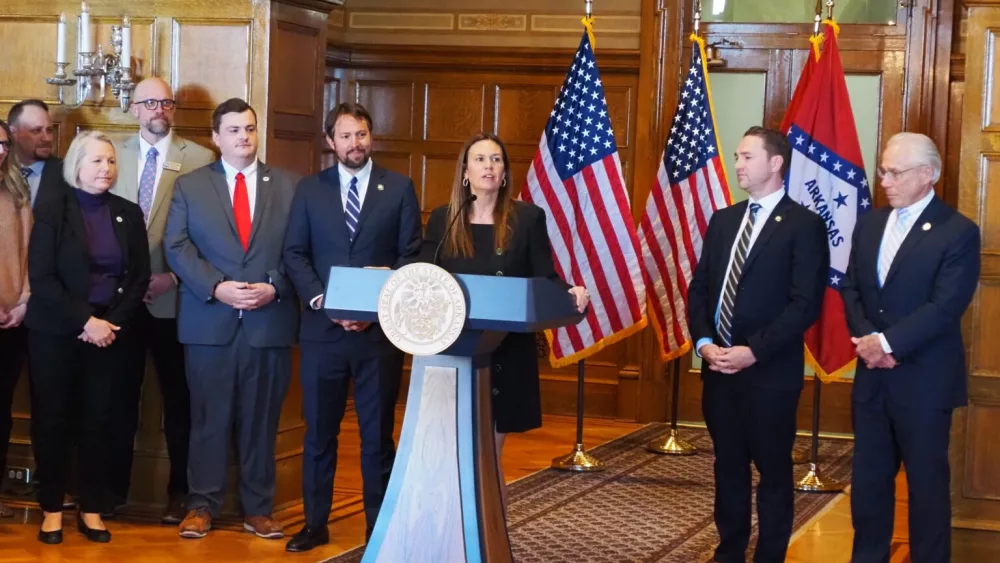
Some schools say LEARNS Act eliminated so-called AMI days
By Antoinette Grajeda, Arkansas Advocate
Arkansas’ first major snow since the passage of the LEARNS Act brought renewed attention to its practical elimination of alternative methods of instruction (AMI) days.
With school canceled last week in much of the state, many districts will be tacking on make-up days at the end of the school year, but one state lawmaker is considering offering legislation to restore the flexibility of AMI days for public school districts.
The LEARNS Act increased minimum teacher salaries from $36,000 to $50,000 and requires all teachers to receive at least a $2,000 raise for the 2023-2024 academic year. The state provides funding to support the increase in teacher salaries and benefits to districts that meet certain requirements, including providing “on-site, in-person instruction” for at least 178 days or 1,068 hours.
After the law’s passage, Rep. Julie Mayberry (pictured above, left) , R-East End, filed a bill to permit up to five AMI days to count toward the on-site, in-person requirement. It failed in the Arkansas House.
Act 862 of 2017 permits the Education Commissioner to grant up to the equivalent of 10 student attendance days for alternative methods of instruction, including virtual learning, when the district is closed due to “exceptional or emergency circumstances” such as inclement weather, contagious disease outbreak or utility outage.
“I would like to bring the topic up during the next legislative session and see if we can come to a more reasonable compromise and get some more clarity and flexibility really for the school districts because really what I’m trying to do is just give some flexibility,” Mayberry said.
LEARNS Act co-sponsor Sen. Breanne Davis (pictured below), R-Russellville, said the new law did not repeal AMI days, meaning districts can use them but they simply won’t count toward the in-person requirement.

Davis said requiring in-person instruction was a response to the “substantial learning loss” students experienced during the COVID-19 pandemic as well as districts requesting AMI days for unintended purposes, such as canceling school to allow students to travel to a championship basketball game.
“There really was an abuse, in my opinion, for what AMI was really intended for, and it really got loose after COVID,” she said. “And so I think it was important to rein that back in and say we believe in the high-quality instruction, and we think that means in person, face-to-face.”
Mayberry sought clarification from Attorney General Tim Griffin regarding the effect of the LEARNS Act on AMI days last year. In an October opinion, Griffin said AMI days likely would not count toward the on-site requirement, but “legislative clarification is warranted” because of a lack of clarity with terms used in various laws addressing AMI days and student attendance.
Davis said she’s always open to changes and cleanup language when necessary, but action will depend on support.
“I’m one person out of 135…if enough members are starting to say, ‘Hey, let’s go ahead and give clearer definitions in other parts of the law that match this definition in LEARNS or vice versa,’ then those are conversations, certainly, that I’m willing to have,” she said.
Funding Requirements
The requirement for 178 days of on-site instruction only applies if districts want to receive state funds for teacher raises. Mayberry questioned what schools wouldn’t want access to extra money.
All traditional public school districts received state funding for additional teacher compensation this year. Of the state’s 23 open-enrollment charter school districts, three did not receive money, according to the Arkansas Department of Education. Two are virtual schools that are ineligible because they don’t meet the in-person instruction requirement and the third was not in existence last year, ADE spokeswoman Kimberly Mundell said.
Batesville School District Superintendent Michael Hester (pictured above, right) said his district has found ways to increase teacher salaries in recent years and could afford to forgo the state funding. However, he said this would negatively impact recruitment and retention efforts in the long run because other districts are accepting the money.
“That was actually going to penalize us for saving and being efficient if we went that route,” Hester said. “So we paid our people, kept the money up and kept our steps for experience and degrees in [the salary schedule] and tried to keep rewarding teachers instead of finding other ways to cut it back from them.”
The LEARNS Act eliminated the state’s minimum teacher salary schedule, which requires additional pay for more experience and education. But districts must create a salary schedule to access the teacher compensation funding.
An analysis of salary data revealed that nearly a third of Arkansas school districts no longer offer increases for experience or education. Some superintendents said it’s temporary as they watch the impact of the LEARNS Act on their budgets and others said it’s all they can afford.
Continuing Education
The advantage of AMI days, Mayberry said, is keeping students’ education on track if they’re away from the classroom for an extended period.
“When [teachers] get back to school, then they have to spend time reviewing what they’ve already taught because the children have all forgotten it,” she said.
When there’s several days of inclement weather like last week, Hester said not using AMI days can challenge educators’ ability to stay on track with their curriculum as they prepare students for state testing in the spring.
“Our pacing has to stay up with testing because they’re not going to delay the testing, so that squeezes our calendar in before the testing,” he said.
While districts can adjust their calendars to meet the in-person requirement, Hester said AMI days provide a better alternative to adding days at the end of the year because it’s difficult to keep students focused or physically present if families have scheduled vacations.
“While we all agree that virtual learning is inferior to face-to-face, we all agree to that, we think that on a limited basis of five to 10 days that we could do AMI just as well as what’s accomplished at the end of the school year when everybody’s thinking about summertime and wanting out or will they even show up,” he said. “We think we could make it as good if not better quality than end-of-the-year days.”
Except for school districts with an alternate school calendar, Arkansas law requires districts to adopt an academic calendar that includes five make-up days, in addition to the 178 student-teacher interaction days required by accreditation standards established by the State Board of Education.
Davis, who helped create academic calendars as a member of the Russellville School Board, said districts can also swap professional development days for student make-up days to keep kids from attending school into the summer months.
The Advocate asked ADE if the state would delay testing if districts miss several days for inclement weather, why AMI days don’t count toward the school calendar if virtual learning is an approved method of instruction and whether there are plans to address the issue or search for a compromise.
Mundell responded by saying “LEARNS did not get rid of AMI days,” and issued the following statement:
“The department firmly believes that in-person learning is the best option for most students. Decisions regarding district calendars, the use of AMI days, and whether or not to close school and use make-up days, however, are made completely on the local district level. Because these are local decisions, the decisions will vary from district to district. Districts should always prioritize the safety of students when making decisions about the instructional day, and it is important to note that districts have the flexibility to adjust calendars and schedules as needed to ensure safety while also meeting the minimum instructional hours requirement.”
Hester said complications like confusion over AMI days are to be expected with a new law like the LEARNS Act, which will likely have more kinks to work out as regulations are developed and implementation details are revealed.
“We’re just now experiencing it, so I’m sure there’s going to be a lot of this — of looking at it, where does it hit reality, what could tweak it better,” he said. “So hopefully we’ll just all keep trying to improve.”
The Arkansas Advocate is a nonprofit, nonpartisan news organization dedicated to tough, fair daily reporting and investigative journalism that holds public officials accountable and focuses on the relationship between the lives of Arkansans and public policy. Images: Mayberry — Arkansas House of Representatives; Davis — Arkansas Senate; Hester — Batesville School District.
Have a news tip or event to promote? Email White River Now at news@whiterivernow.com. Be sure to like and follow us on Facebook and Twitter. And don’t forget to download the White River Now mobile app from the Google Play Store or the Apple App Store.
Get up-to-date local and regional news/weather every weekday morning and afternoon from the First Community Bank Newsroom on Arkansas 103.3 KWOZ. White River Now updates are also aired weekday mornings on 93 KZLE, Outlaw 106.5, and Your FM 99.5.











